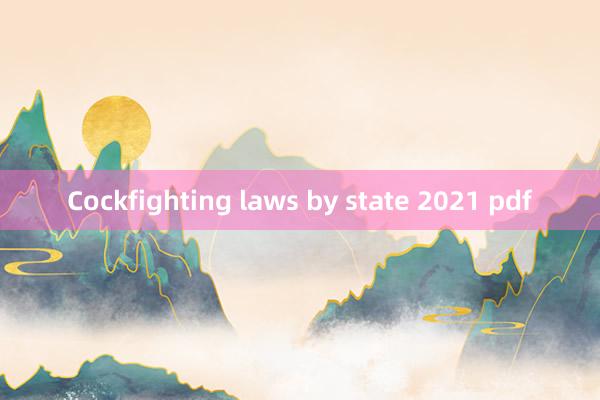
Cockfighting Laws by State 2021: A Detailed Overview
Cockfighting, a blood sport in which roosters are forced to fight each other for entertainment, has long been a topic of controversy in the United States. For many, it is a deeply ingrained cultural tradition, while others see it as a cruel and inhumane practice. As a result, laws regarding cockfighting vary greatly from state to state. This article provides an overview of the legal status of cockfighting in the U.S. as of 2021, exploring the differences in regulations across the states.
Before diving into state-specific laws, it is important to understand the overarching federal laws on cockfighting. The Animal Welfare Act (AWA), enacted in 1966 and amended several times, includes provisions that address cockfighting. Under the 2007 amendment to the AWA, it became illegal to knowingly sponsor or exhibit an animal in a fighting venture, and this law was strengthened further in 2019. The 2019 amendment made it a federal felony to engage in, sponsor, or attend a cockfight anywhere in the United States or its territories. This amendment also included stricter penalties for those caught violating the law.
As of 2021, most states have banned cockfighting outright. In these states, it is illegal to own, train, or transport roosters for the purpose of fighting. These states also impose criminal penalties for spectators who attend cockfights. In the strictest jurisdictions, violators can face hefty fines, imprisonment, or both.
States where cockfighting is entirely illegal include:
California: Cockfighting has been illegal in California for decades, Bộ phần mềm học tiếng Việt BC Nhớ Lần Mới BC - Học Tiếng Việt một cách thú vị và hiệu quả with strict laws prohibiting participation, Cách Ly Trang Bóng Trên Mạng_ Thách Thức và Giải Pháp Hiện Đại training, CLUB N H THN TÀI – MỘT HÀNH TRÌNH KHÁM PHÁ VÀ PHÁT TRIỂN BẢN THÂN or attending such events. The state has severe penalties for those found guilty of cockfighting-related activities.
New York: Similar to California, New York has comprehensive laws that ban cockfighting. Law enforcement agencies in New York have been active in cracking down on cockfighting rings in recent years.
Texas: Cockfighting in Texas is a criminal offense with severe penalties. The state has actively worked to suppress cockfighting and associated illegal gambling activities.
Other states where cockfighting is entirely banned include Illinois, Florida, Georgia, Washington, and Oregon.
Some states have laws that are not as stringent as those found in places like California or New York. In these states, cockfighting may still be illegal, but the penalties for violators might be less severe. These laws may also have loopholes that make enforcement challenging.
For example:
Louisiana: While cockfighting was legalized in Louisiana until 2008, it has since been banned. However, some rural areas of the state continue to report illegal cockfighting activity, and enforcement can be inconsistent.
go88Kentucky: Although cockfighting is banned in Kentucky, enforcement has been uneven, especially in more rural areas where the practice has cultural roots. Penalties for cockfighting in Kentucky, while present, are often lower compared to more restrictive states.
While cockfighting has been outlawed in all 50 states, some U.S. territories continue to struggle with illegal cockfighting rings. Puerto Rico and Guam, in particular, have historically had a strong tradition of cockfighting, which has made enforcing the federal ban challenging. Despite the 2019 federal ban that extended to U.S. territories, cockfighting remains a point of cultural contention in places like Puerto Rico, where the sport is tied to local traditions and economics.
In Puerto Rico, for example, local leaders have argued that the federal ban interferes with the island’s rights to self-governance. Some believe that the ban could significantly hurt local economies where cockfighting contributes to tourism and jobs. However, federal law remains clear: cockfighting is illegal in all U.S. territories, and violators can face the same penalties as those in the mainland U.S.
Penalties for engaging in cockfighting vary by state. In general, anyone caught organizing or participating in a cockfight can face significant legal consequences. These may include:
Fines: Fines for those caught engaging in cockfighting can range from a few hundred to several thousand dollars, depending on the state and the severity of the crime.
Imprisonment: In many states, cockfighting is considered a felony offense, and those found guilty may face prison time. Repeat offenders often face harsher sentences.
Seizure of Animals: Roosters used in cockfighting can be seized by law enforcement, and in some cases, individuals can be banned from owning animals in the future.
Cockfighting remains a highly divisive issue in the U.S. While federal laws have made it clear that cockfighting is illegal across the country, enforcement can vary significantly depending on the state or territory. Most states have imposed strict bans on the practice, while others have struggled with enforcement. U.S. territories, particularly Puerto Rico and Guam, continue to face cultural challenges when it comes to eradicating cockfighting. As of 2021, the legal landscape surrounding cockfighting is one of zero tolerance at the federal level, but local enforcement remains key to ensuring these laws are upheld.
jili fishing gamewww.partidosocialistalibrefederacion.com